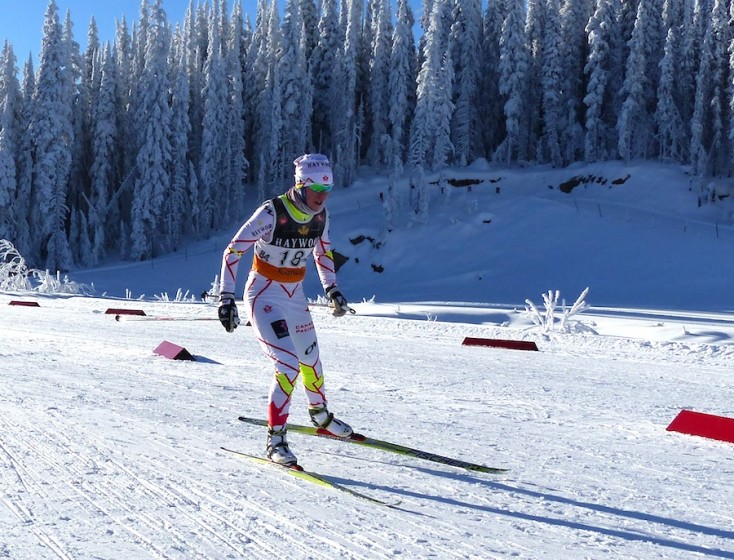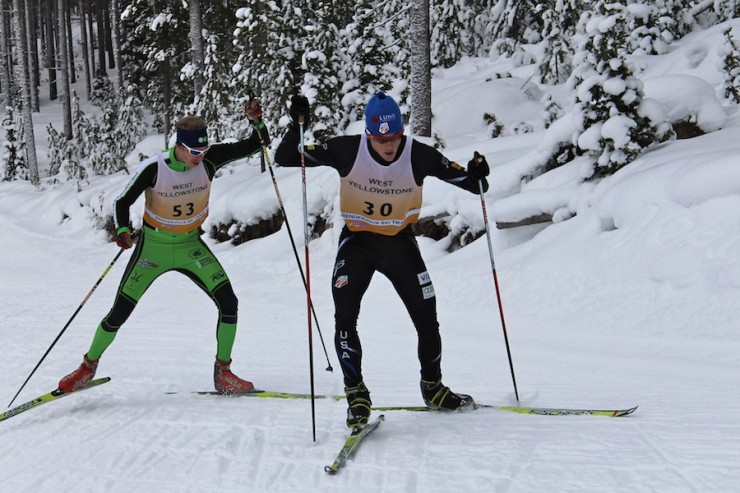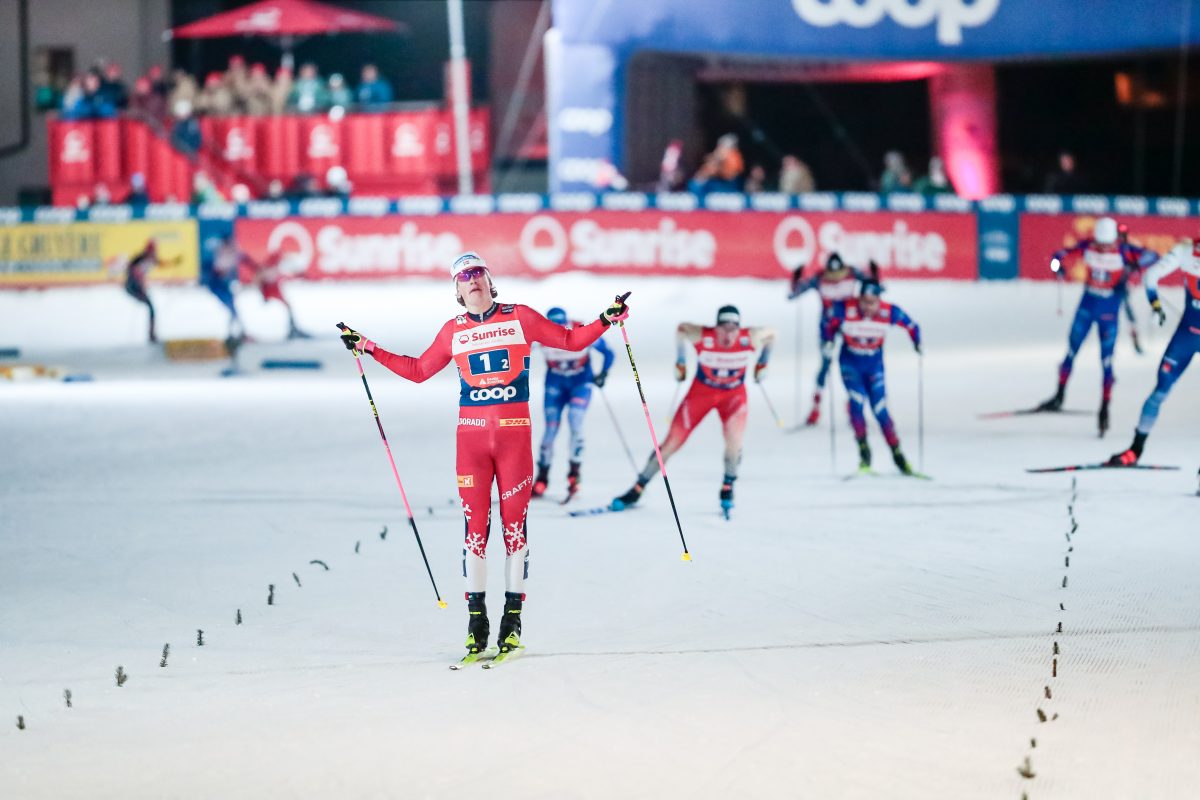
Saturday’s NorAm freestyle sprints at the Black Jack Ski Club delivered an exciting day of racing, with crashes, tactic changes between rounds, and photo finishes in Rossland, B.C.
Emily Nishikawa of the Alberta World Cup Academy (AWCA) and Canadian National Senior Team (NST) won the women’s 1.4-kilometre A-final by 0.22 seconds in 3:21.29, and teammate Heidi Widmer edged Olivia Bouffard-Nesbitt (Laurentides) in a photo finish for second.
The Americans rounded out the rest of the A-final with Caitlin Patterson (Craftsbury Green Racing Project) in fourth, Jennie Bender (Bridger Ski Foundation) in fifth and Caitlin Gregg (Team Gregg/Madshus) in sixth. After crossing the line in fourth, a jury decision bumped Gregg to sixth after she collided with Bender in the finishing straight. Bender went down; Gregg did not.
“I was relegated to 6th place and I deserved it,” Gregg wrote in an email.
The women’s final was considerably faster than qualification, with qualifier winner Bouffard-Nesbitt taking five seconds off her qualification time of 3:26.26.
In an email, Nishikawa wrote that she “got off to a slower start in the qualifier, but I felt much better throughout the heats.”
She was happy with her day and the way the season is starting, a noticeable upgrade from one week earlier when she said she was “looking forward to some more races” to show what her training had accomplished.
The women’s heats were closer and more tactical than the previous NorAm at Sovereign Lake.
“Most of the heats were really tight,” Nishikawa wrote. “With a fast finish stretch I barely squeaked into the final!”
American Caitlin Gregg (Team Gregg/Madshus) kicked off the final the same way she won both her heats, trying to drop the group on the opening climb. “This [tactic] worked well until the final when Emily and the other ladies could stay with me,” Gregg wrote. “Emily had an incredible surge up the steepest hill on the course and took the lead from there on out. It was impressive!”
Widmer used the same tactics as Gregg to win her quarter, but “barely squeaked into the final because the others came up so quickly in the finish” of her semifinal.
Widmer and Nishikawa finished 0.04 seconds apart in their semifinal to take the lucky loser spots, relegating Alysson Marshall to the B-final by 0.2 seconds.
Bouffard-Nesbitt tried to hang back in the final.
“After the ‘S’ turn I was carrying a lot more speed than the person ahead of me,” she wrote in an email. “But had Emily and Heidi coming up on my right so I had no choice but try to squeeze by on the left.”
She pushed the last corner to work her way up to the photo finish for second. She was happy with her result and first qualification win.
“I learned a lot today though!” she added.
Bjornsen Nabs First Win of the Season

In the men’s 1.6 k skate sprint, Erik Bjornsen of Alaska Pacific University (APU) and the US Ski Team (USST) changed his tactics to come out on top in the A-final in 3:37.53, 0.19 seconds ahead of fellow American Miles Havlick of the Sun Valley Ski Education Foundation (SVSEF) in second.
Only two Canadians advanced to the final, including Graham Nishikawa (NST), who placed third. Sylvan Ellefson (SSCV/Team HomeGrown) finished fourth, Dakota Blackhorse-von Jess (Bend Endurance Academy) was fifth, and Knute Johnsgaard (Yukon Elite) placed sixth.
“In the quarters I thought I could go out and control the race,” Bjornsen wrote. “But I quickly learned my lesson when I got out sprinted by two people in the finishing lanes.”
After getting “lucky” in the semi “when two Canadians went down,” Bjornsen advanced to the final.
“I stayed comfortable, kicked hard over the tops of hills, and prepared myself for the final sprint,” he explained. “When I made the move past Dakota and Miles in the finish I could see the win, I was just a happy little bear.”
In his first year with the SVSEF Gold Team, Havlick was “psyched” by his second place.
“As a junior, I used to be a pretty strong sprinter but after 4 years of NCAA skiing (without sprinting), it has been tricky finding that next gear again,” he wrote. “But today, it felt like it was back.
“The courses today were tough and like 2 weeks ago [at the SuperTour] in West Yellowstone, offered few opportunities to pass after the start,” Havlick added. “I wanted to be aggressive and get out early and keep the pedal down from there.”
Nishikawa was happy with third. “I felt better throughout the heats so that was positive and the main goal of the day,” he wrote.
Like a number of the more experienced Canadians who have been describing the NorAm races in terms of process rather than results, his focus appears to be locked on Sochi.
Johnsgaard was frustrated by the tactical choices that put him sixth in the A-final. Coming into the final 100 metres, he “tucked in behind Miles and Dakota, but the guys behind us really worked the downhill and swallowed us up.
“I was mad at myself for letting up on the last downhill because I thought I could get on the podium today for the first time,” he wrote.
At 21, he is determined to get to U23 World Championships and needed more to break AWCA member Patrick Stewart-Jones’ grip on the top spot. Based on the first two NorAm weekends, one Canadian male and one female will be pre-selected for U23s.
After winning his quarterfinal, Michael Somppi (AWCA/NST) crashed in the semifinal, which didn’t remedy his frustrations with his early season races. He ended up eighth overall behind Stewart-Jones in seventh.
“I tried to start strong in my heats and set a hard pace on the first climb,” Somppi wrote. “It’s really the only place on the course you could make people’s legs burn. The rest of the course was fast and twisty so passing was difficult.”
This tactic “worked for me in my quarter-final heat and was working in my semi-final as I was skiing in second place before I crashed,” he explained.
“You often need a little luck on your side in sprint racing and today I didn’t have a horseshoe,” Somppi concluded.
There are a number of racers who might agree with that.



